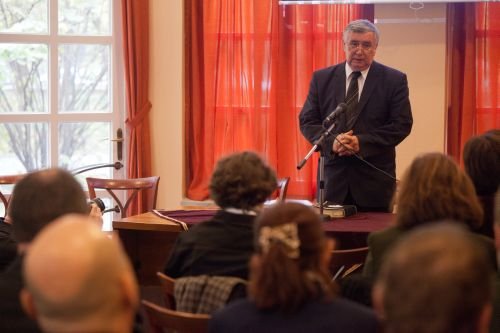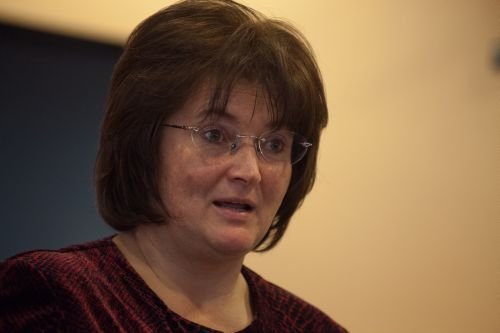Beside hospital ministers and counselors, the event was attended by bishops, deans, Tibor Fedor (Ministry of Human Resources, Head of Department), hospital managers, director-generals, medical directors, nursing directors and workers of the Reformed Mission Centre.
"This ministry is very special", said Gusztáv Bölcskei, Presiding Bishop of RCH, in his opening devotional. Looking at the closing passage of Philippians, he mentioned that the elevated, miraculous truths of faith and the petty, insignificant things of human life are mingled in this epistle the same way as they are in the life of a minister. These aspects of life keep each other in balance, but every time the elevated or the everyday things gain control, the effect can be harmful. Also, being a good listener can provide much help in many situations, as the Apostle says, "Yet it was good of you to share in my troubles." (Philippians 4, 14). The Presiding Bishops's devotional concluded with giving thanks for the opportunities the Church was presented with in these past 20 years, as more and more hospital doors opened up for mission work.

The field of hospital ministry is a rather complex one. It includes the task of Christian service, but it also involves healing. Those who work in this field are not only working with patients; they also have to pay attention to the ill people's relatives and the exhausted hospital staff. Thus they see to tasks that are out of the scope of any government budget.
"An ideal meeting point for the Church and medical care is the Bethesda hospital which is soon to celebrate its 150th anniversary", said director-general György Velkey in his speech. He touched upon the fast progress in medicine during the past century, remembering the major role of churches, deaconesses and church orders in this process. Advance in technology gave way to opportunities, but it also made medicine somewhat impersonal and materialistic. Medical workers had become solitary "fighters" in their own fields of work. Through the past 20 years of hospital service, even the patients have changed. The ill people of today often turn to medicine with a religious belief, but they are also growing more and more defenceless in this inhuman system, and they seek protection under the canopy of alternative medicine.
"What significance does the service of hospital ministers have in this rather complicated system? These devoted workers should have a highlighted role within the hospital staff", opined György Velkey, adding that the work community of Bethesda hospital would not be so unified and efficient if the hospital minister was not giving them so much support. In the world of hospitals, where a system of hyerarchy is so typical, community-building and showing an example of humility are vitally important.

György Velkey drew his listeners' attention to the significance of recogising the crisis in the lives of patients, and providing instant help. Although spiritual crisis can only be recognised after physical, financial, social and psychological breakdowns, a human being can only be seen and healed in its entirety from the spiritual aspect. Hospital ministry should be firmly built into the life of hospitals, and the cooperation of state and church in the field of medicine should be systematically established. "Although hospital ministers have not been given a role in the Semmelweis plan, there is an obvious demand for spirituality. As a consequence, it is not sufficient for hospitals to employ psychiatrists to fulfil the deep needs of patients", the director-general said.
Judit Gál, Head of the Hospital Mission summarised some of the features of hospital work in her speech. "Only those people can be of help who have been permeated with the love of Christ, who can lend an ear, because this is how diagnose-centred help can turn into patient-centred assistance", she said, adding that the present reshaping of the field of medicine will have a serious effect on hospital ministry too. Those involved in the ministry do not always know whom to turn to for help. At the same time, perseverence in service is important. The Church is obliged to be present at the hospital beds; neglecting this task would be a serious symptom of crisis. "It is absolutely necessary for those who opt for this career to have a special calling, as the tasks we have to accomplish are much different from what a church minister has to do. In hospitals a completely different language is spoken. You need good skills for communication. It is a must to have deep empathy, humility and a character of integrity", she added.

Hospitals and illnesses only form a small segment of life, although this segment is mentioned frequently. As László Péntek, Board of Trustees President put it in his closing words: "Be strong in the Lord. Indeed, we need big refills of God's power from day to day, because refills from human sources are not enough to keep us going."
At the event the winner of the "20 years of hospital mission" competition was announced. The only submission was solely based on online sources, which made it clear that the rich and colourful history of this mission field should be made available on the internet for all who are interested.
Zsuzsanna Bagdán
Translated by Katalin Burns